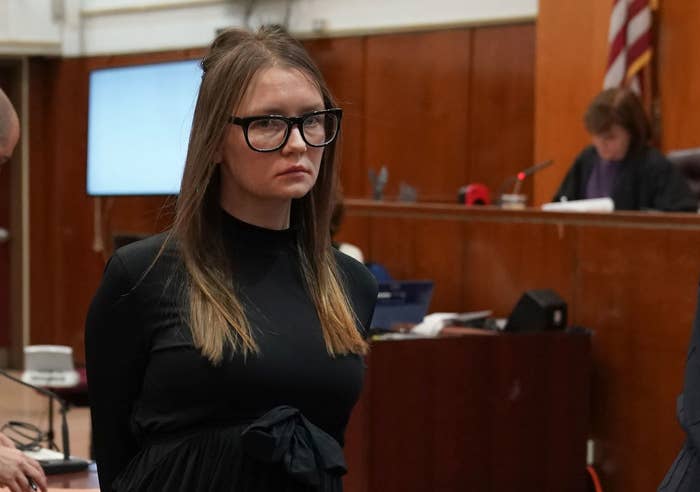
Scammers make for easy content. Like all crime stories, conning has the ease of a readymade narrative: There’s the buildup of the enterprise, the dramatic collapse, and then some comeuppance for the scammer or, depending on the moment’s mood, a celebration of their Robin Hood–esque scheme.
We’re used to seeing women as victims in these stories, like Debra Newell in the Dirty John podcast, the women in the Netflix documentary Tinder Swindler, or the majority of the women in Lifetime movies. More rarely, they’re depicted as perpetrators — like Elizabeth Holmes and her nonstarter startup. Exploring the fraught role of women protagonists in these stories could illuminate the ways, say, heterosexual romance or venture capital “feminism” are cons themselves.
The new ambitious Shonda Rhimes–created extravaganza Inventing Anna, about the fake German heir Anna Delvey (born Sorokin) and her artist philanthropy aspirations, had so much potential. The white girl grifter protagonist (played perfectly by Ozark’s Julia Garner) was the perfect vehicle for producing biting commentary on contemporary class and gender mores — from venture capitalism to the philanthropic industrial complex. Instead, the show sticks too closely to its protagonists’ own script to really tell us anything new.

The outlines of the Anna Sorokin story have, by now, become pop cultural legend. The so-called Soho grifter became a local New York tabloid curiosity as a “wannabe” German socialite when she got kicked out of New York hotels like the Beekman and the W for nonpayment.
Then a 2018 Jessica Pressler New York magazine article fleshed out the story a bit more, explaining how she’d also been trying to get funding for an Anna Delvey Foundation supposedly to benefit artists.
Pressler also wrote the article that inspired the 2019 film Hustlers, which was about a team of strippers who robbed their wealthy white male clients. The movie successfully turned the scam into a compelling character study, especially as the two masterminds (played by Jennifer Lopez and Constance Wu) clash and the whole thing implodes.
With the Delvey story, you have one sullen white woman looking out for herself, and the writers had to stretch out her story into nine hours of marathonable episodes. To solve this, the show makes a major character out of the journalist telling Anna’s story, the fictional Vivian Kent (Anna Chlumsky), basically an audience stand-in for all the questions about how Anna hustled $200,000 out of hotels, a friend, and an investment firm.
But the series can’t get out of its own way as it depicts Vivian as implausibly naïve, as she insistently views Anna as a failed self-starter with a heart. The show emphasizes that Anna had skills, that she really knew how to act upper class — with supposedly chic underdressing — and was some kind of genius, as she woos rich friends (all fictional composite characters) while posing as an heir with a trust fund.
The series insists on imbuing Anna with the noblest of motives: naïveté and belief in the goodness of her project.
This becomes especially apparent when she convinces a rich husband of a friend to invest in a venture capital bullshit startup, Wake (probably the most accurate satire in the entire series, it’s an app that instrumentalizes dreams). He ends up dating her. They break up through a power struggle when she starts really wanting to build her own thing, the Anna Delvey Foundation. The comedy of the fact that she specifically wanted to be paid to be a philanthropic socialite is completely glossed over.
Instead, the series insists on imbuing Anna with the noblest of motives: naïveté and belief in the goodness of her project. “I think she was moving on faith. I don't know if this was totally a scam, I think she believed,” Vivian muses out loud. The show proceeds to undercut such sentiments, but given that baseline, any kind of self-interest by Anna is then supposed to be moral complexity.
The show inflates the supposed friendships Anna has with life coach Kacy (Laverne Cox), hotel concierge and aspiring filmmaker Neff (Alexis Floyd), and Vanity Fair photo editor Rachel (Katie Lowes), who in real life wrote a Vanity Fair article and book about her friendship.
The few moments that feel charged are in the relationship between Anna and Rachel as Anna creates a situation that pressures her into paying $60,000 for a trip to Marrakesh. In that single moment, one gets a real sense of how Anna operated. And the show isn’t afraid to make Rachel annoying either, especially her colonizing tourist appetites. But the question of their friendship, and whether it was genuine or not, which the show emphasizes, isn’t that interesting.
It’s Rachel who ultimately brings down Anna, and she’s now set to be depicted in her own HBO miniseries. There’s ultimately something of a con at the heart of this show: Because Pressler is a producer, and as we’re told by the end, the “entire series is inspired by Pressler’s reporting,” viewers will be left wondering which information might be made up, and which might have come from the reporter, including the few bits of actually new information in here. For instance, when Vivian flies out to investigate Anna’s backstory, her mom gives a chilling We Need to Talk About Kevin moment when she states that some children are just “strangers under your roof” and “Anna was a stranger her whole life, a cold stranger.”
And aside from such moments, Inventing Anna suffers from what we might at this point call explainer syndrome. This is the issue with streamers buying stories that are already well known and assuming — perhaps correctly — that the public will want to see everything they already know about the case laid out. But even though Netflix bought Anna Sorokin’s story for a reported $320,000, that over-reliance on her perspective just made it harder to depart from the story enough to really get at something original.
The recent HBO show The Landscapers benefitted from focusing on a more obscure couple of English supposed grifters who were accused of murdering the wife’s parents and then impersonating them supposedly for the money. The writers turned the story into a riveting tale about trauma, the mystery of marriage, and the stories people tell themselves and others to survive.
In trying to make the show about gossip and the media, Inventing Anna actually misses whatever it is that Anna herself was up to and rather focused on what she thought she was doing. Instead of adding complexity, it just comes off as muddled. ●
